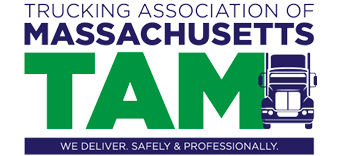On July 26, Kevin Weeks, the executive director of the Trucking Association of Massachusetts, submitted written testimony in opposition to House Bill 312, An Act Relative to a Model Carrier Reporting Requirement.. The testimony is provided below, and a PDF is available for download.
For additional information, contact the Trucking Association of Massachusetts.
Honorable Tackey Chan, House Chairman
Honorable Paul Feeney, Senate Chairman
Joint Committee on Consumer Protection and Professional Licensure
State House, Room 42
Boston, Massachusetts 02133
Dear Chairman Feeney, Chairman Chan and Members of the Committee:
On behalf of the over 250 member companies of the Massachusetts Motor Transportation Association (TAM), I am writing in strong opposition to House Bill 312, An Act Relative to a Model Carrier Reporting Requirement. This legislation, which contains many practical problems, is in direct opposition to federal law and accompanying case law.
As you know, House Bill 312 would require railroad companies, express companies, common or contract carriers, and firms or corporations that bring, carry or transport wine, beer or distilled spirits to file monthly reports with the Alcoholic Beverages Control Commission. The legislation requires that these monthly reports to include information regarding the name and license number of the supplier, the quantity of wine, beer or distilled spirits shipped, the recipient’s name and address, and an electronic or paper form of signature from the recipient of the wine, beer or distilled spirits. (emphasis added). Finally, the legislation requires the preservation of such records for 3 years and includes staggered penalties for violations of the proposed law.
At the outset, House Bill 312 is likely preempted by a number of federal provisions governing the trucking industry. Federal law has preemption over state law where Congress has expressed a clear and manifest purpose in regulating a specific industry. Rice v. Santa Fe Elevator Corp., 331 U.S. 218, 230 (1947). Here, Congress has quite clearly chosen to regulate states’ abilities to regulate the trucking industry and the transportation of property. In particular, federal law prohibits a state from enacting or enforcing “a law or regulation or other provision having the force or effect related to the price, route or service of any motor carrier or any motor carrier, broker or freight forwarder with respect to the transportation of property.” 49 U.S.C. § 1450(c)(1). Moreover, direct freight shippers, such as FedEx and United Parcel Service (“UPS”), are also governed by a similar provision governing direct air carriers. 49 U.S.C. §4173(b)(4). As such, any state law that conflicts with the Supremacy Clause of the United States Constitution is null and void. Maryland v. Louisiana, 451 U.S. 725, 746 (1981).
House Bill 312’s restrictions on the acceptance of packages by delivery companies, conditions on the conduct of their drivers, and the imposition of significant costs and restrictions clearly affects “the price, route or service of any motor carrier or any motor carrier, broker or freight forwarder with respect to the transportation of property.” See 49 U.S.C. 1450(c)(1). Many of the actions listed in this legislation directly contradict federal law regulating interstate commerce. No motor carrier or delivery service will be able to incorporate the requirements of this legislation without having an effect on their pricing or service. As a result, House Bill 312 contravenes existing federal law and, if passed, will not survive a likely federal preemption challenge.
To this point, the United States Supreme Court has already decided that a similar, tobacco-related law in Maine, which required similar electronic signature verification and an accounting of package contents, violated federal law. Rowe v. New Hampshire Motor Transp. Assn., 552 U.S. 364 (2008). Much like House Bill 312, which both presumes the motor carrier knows the quantity of the alcohol in the shipped package and maintains certain state-specified information, the United States Supreme Court found that Maine’s similar requirement violated 49 U.S.C. § 14501 because the proposed tobacco law created:
“a conclusive presumption of carrier knowledge that a shipment contains tobacco in the specified circumstances. That presumption means that the law imposes civil liability upon the carrier, not simply for its knowing transport of (unlicensed) tobacco, but for the carrier’s failure sufficiently to examine every package. The provision thus requires the carrier to check each shipment for certain markings and to compare it against the list of proscribed shippers, thereby directly regulating a significant aspect of the motor carrier’s package pick-up and delivery service and creating the kind of state-mandated regulation that the federal Act [49 U.S.C. § 14501] pre-empts.” 552 U.S. 364, at 369-370.
Just like the proposed law invalidated by Rowe, HB312 requires transporters to report the quantity of alcohol being shipped and verify certain information is in accordance with state-mandated requirements. Notwithstanding any purported public health purpose, the court in Rowe specifically ruled that “to insist that the carriers provide a special checking system would allow other States to do the same. And to interpret the federal law to permit these, and similar, state requirements could easily lead to a patchwork of state service-determining laws, rules, and regulations.” Id. Finally, with respect to any public health argument offered by proponents of this legislation, the court in Rowe held that “the federal law does not create a public health exception, but, to the contrary, explicitly lists a set of exceptions that do not include public health. See, e.g., §§14501(c)(2) to (c)(3).” Id. at 371.
For the aforementioned reasons, the TAM respectfully requests that the Committee issue a study order for HB312. If the Committee wishes to attempt a redraft of this legislation, the TAM respectfully requests a role in such process to offer insight as to what is practicable and legal to require from motor carriers. Otherwise, any such state law may simply be reversed for failure to comply with judicial precedent surrounding 49 U.S.C. § 14501.
I appreciate your consideration of this important matter. If you have any questions or concerns, please do not hesitate to let me know.
Sincerely,
Kevin Weeks
Executive Director
1 This legislation presents many practical problems for trucking companies. First, there is no way for a motor carrier to actually know what the “quantity” of alcohol in a package is, the motor carrier does not assemble the package. Calculating the weight of a package does not reveal the quantity of alcohol in a package, it reveals the weight of the alcohol, the alcohol container, the packing slips and any internal package protection. Second, not every state requires a “license number for the shipper” to be either tracked or included as part of the receipt or shipping label. This would require companies to create an additional space in uniform packing slips and labels, not to mention, updating software systems, just to account for a Massachusetts specific requirement. Third, creating civil penalties on motor carriers if the shipped alcohol does not match the bill of lading is unfair. Motor carriers do not open packages to verify what the shipper asserts. Assuming there has been no in-transit incident (i.e. motor vehicle crash), if the packing slip does not match the contents of the package, it is the responsibility of the shipper to ensure that the contents and packing slips match. These practical problems further underscore the simple fact that the proposed law will likely impact the “price, service or route” of a motor carrier.
Enclosures
(a) Rowe v. New Hampshire Motor Transp. Assn., 552 U.S. 364 (2008)
(b) 49 U.S.C. § 14501

